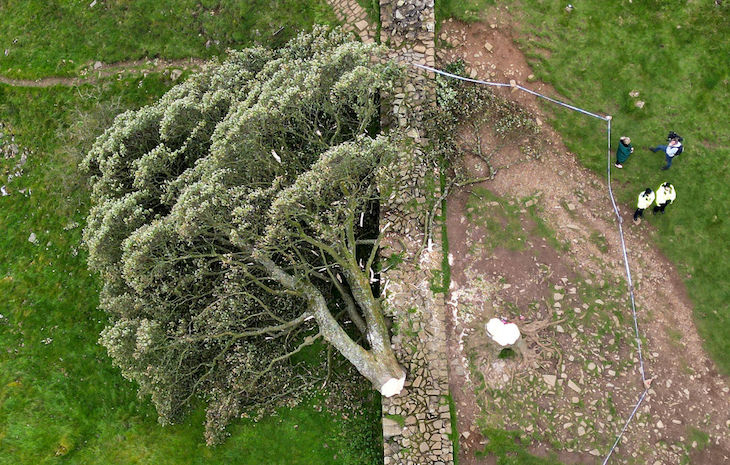Our trees – oak and beech, soft and ancient, sycamores, whose seeds spin and tumble away every autumn – are one of the most beautiful things about England. I love them all – and have nothing but contempt for someone who needlessly destroys a tree which has taken decades, or centuries, to grow and might live for decades, or centuries, more.
Despite this, I am deeply concerned by the way our justice system has treated Daniel Graham and Adam Carruthers, the two men from Cumbria who hacked down the famous Sycamore Gap tree in September 2023. At Newcastle Crown Court yesterday, the pair were sentenced to four years and three months in prison.
How do these sentences compare to recent, high-profile crimes?
How do these sentences compare to recent, high-profile crimes? Just last month, a 16-year-old boy involved in a firework attack that led to the death of a pensioner received a sentence of two years and eight months. A man who carried out a ‘vicious and violent attack’ last summer in which he stamped on his victim’s head, having ‘probably’ targeted the man because he was white, was sentenced to just two years and ten months in jail. Men, even police officers, found in possession of child sexual abuse imagery are regularly spared jail. So why were Graham and Carruthers locked up?
However loved the tree which bordered Hadrian’s Wall was – however stupid and destructive Graham and Carruthers were – their sentences feel unjustly high, particularly at a time when the government is keen to reduce the use of prison, especially for non-violent offenders.
The judge, Mrs Justice Lambert, said she suspected they were motivated by ‘sheer bravado’ and ‘some sort of thrill’. This may well be true. Perhaps the men’s apparent character, or their initial denials of their crime, led to their stiff sentence.
The judge herself spoke movingly about the tree, saying it ‘had become a landmark, a symbol of the beauty of the untamed landscape…a place of special, personal significance, where marriages were proposed and personal tributes to loved ones were left. It was a place of peace and tranquillity, to which people returned year after year and the public reaction has extended far beyond those who had visited the tree’.
Lambert also described ‘heartfelt messages’ from members of the public, and media reactions of ‘widespread shock and bewilderment’. Perhaps this impression affected her sentencing decision of the men she labelled ‘morons’.
Or perhaps it was the victim impact statement, by National Trust general manager Andrew Poad, who said ‘this iconic tree can never be replaced’. This, of course, is simultaneously true of every tree, unique beings which they are, and not true at all, because we can just plant more sycamores, a type of tree that pops up like a weed.
Poad went on, saying that ‘whilst the National Trust has cared for it (the tree) on behalf of the nation, it belonged to the people’, and that the loss of this ‘totemic symbol’ and ‘place of sanctuary’ was met with ‘an outpouring of love and emotion’. Faced with such evidence of the very great importance of this tree, and with the very precise value of £458,000 attached to it, perhaps Justice Lambert felt compelled to issue a very high sentence.
Yet it all seems rather silly. The Sycamore Gap tree was a lovely tree, of course. But it was far from some ancient symbol of the land. The sycamore was apparently planted late in the Victorian era. Yes, people are sad, and angry that two idiots hacked it down. It’s a shame.
But to jail two men for years, at a cost of around £50,000 per person per year, feels like a bizarre overreaction, as does the fact that they have both been held on remand for months. People are entitled to their outpourings of anger and sentimentality, but those emotions should have no place in sentencing decisions. As with the response to the riots last summer, it seems that public opinion, and appeals to emotion may have resulted in excessive sentences. This is no way to run a justice system.








Comments